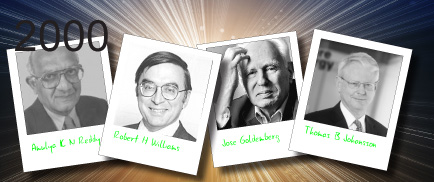The 2000 Volvo Environment Prize was awarded Professor José Goldemberg, Professor Thomas B Johansson, Professor Amulya K N Reddy and Dr Robert H.Williams, representing four continents, for their joint work on the global energy problem.The emphasis is on energy use rather than supply and is manifested in co-authored books having had important influence on global policy work. One constructive idea in the laureates’ work is that of bringing technologies into practice in the South that have not previously been commercialized in the North. It points a way to global energy systems that are environmentally sound and responsive to human needs.
The Prize Jury’s Citation:
The Volvo Environment Prize for this year is awarded jointly to Professor José Goldemberg (Brazil), Dr. Thomas B. Johansson (Sweden), Professor Amulya K. Reddy (India) and Dr Robert H. Williams (USA), for their outstanding collaborative achievement since the early 1980s of working out a new policy-driven approach to the technical analysis of world energy needs and how they could be provided for the early decades of this century. Starting from a highly detailed examination of the prevailing patterns of energy end-use demand and their likely future trends, they have shown that it is still possible to take a whole-world view of the energy problem. They have identified and described strategies providing a more informed basis for public policy decisions that would not only avoid the many problems arising from our continuing with world energy use on a “business-as-usual” basis but also would be consistent with the solution of other important global problems. Their pathbreaking joint work provides a vision making environmentally responsible global development possible.
Our laureates have similar academic backgrounds. They are trained in physics and have during their career turned to renewables and energy efficiency. But each of them has also brought a different approach to their joint work.
José Goldemberg, From 1990-92 he served the federal government in various capacities: as the Secretary of State for Science and Technology he modernized the information systems; as interim Secretary of the Environment he administered Brazil’s participation in the 1992 Earth Summit in Rio de Janeiro; and as Minister of Education he prepared the proposal to Congress resulted in autonomy for federal universities. Goldemberg received his Ph.D. in Physical Science from University of Sao Paulo, of which he is former rector and professor.
Very important, and an achievement in itself, he helped to orchestrate the Brazilian-Argentinian agreement to shut down both countries’ nuclear-weapons programs.
Thomas B. Johansson, is Professor of energy systems analysis and Director of the International Institute for Industrial Environmental Economics (IIIEE) at the University of Lund, Sweden, and Senior Advisor on Energy and Climate Change to the United Nations Development Programme /UNDP). From 1994 to 2001, he was Director of UNDP´s Energy and Atmosphere Programme. He served on the Editorial Board of the World Energy Assessment, 1998-2000.
Johansson has built a formidable and enduring program with China that has led, with the help of the other three, to numerous forays into “leapfrogging,” ranging from fuel cell buses to coal-bed methane development and beyond.
Thomas B. Johansson is currently a member of the Volvo Environment Prize Scientific Committee.
Amulya K. N. Reddy, (1930-2006) Electrochemist, energy analyst, rural energy, practitioner, appropriate technology, pioneer, spokesman for sustainable development,campaigner against nuclear energy
and weapons, respected teacher. Reddy received his Ph.D. in Applied Physical Chemistry from Imperial College, London. He was an electrochemist and has for 20 years been professor in chemistry in the Indian Institute of Technology, Bangalore. He turned to problems of village energy supply, and there he broken entirely new ground.
Reddy and Goldemberg have also had a great influence on scientists from developing countries. They have set a widely noted example, legitimizing work on developing country energy problems for new generations of scientists.
Robert H. Williams, is a Senior Research Scientist at the Princeton Environmental Institute (PEI), Princeton University, where he heads the Energy Systems/Policy Analysis Group. Under PEI’s BP/Ford-supported Carbon Mitigation Initiative (CMI), he also leads the Carbon Capture Group. In 1975 he joined Princeton’s Center for Energy and Environmental Studies. He has international assignments for the UNDP on World Energy Assessment. He also has national assignments with the President’s Committee of Advisors on Science and Technology. Williams is a creative and fanciful inventor of technological options.
——————————————————
The four together coauthored Energy for a Sustainable World. This book is superior to other well-known global energy futures studies. No other individual or group has treated the global energy problems with such a wide scope. Three of them then co-authored Renewable Energy – Sources for Fuels and Electricity, perhaps still the “bible” of solar energy technology. All four played influential roles in the programs of the World Resources Institute and the Rockefeller Foundation.
All four founded the International Energy Institute, a South-based non-governmental organization that promoted energy efficiency in developing countries. All four founded a south-based journal: Energy for Sustainable Development.
Tags: Energy, Environment, Sustainable Development, Volvo Environment Prize, Winner

Leave a comment